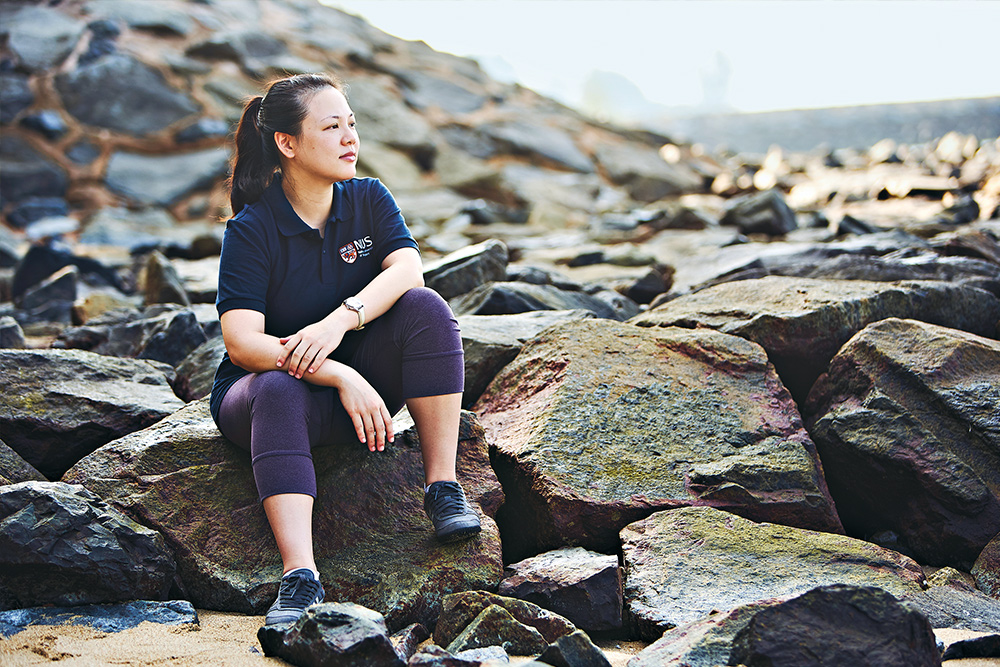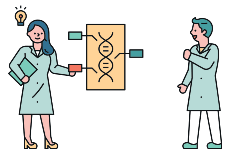Queen of the Deep
One of Singapore’s leading champions of marine conservation, scientist Dr Neo Mei Lin (Science ’09, PhD ’13) shares why bringing research out of the lab, and into everyday lives, matters.
WHO IS SHE?
Known among peers as the “Mother of Clams”, marine scientist and conservationist Dr Neo Mei Lin has been credited with single-handedly restocking the endangered giant clam in Singapore waters. The winner of the NUS Outstanding Young Alumni Award (2017) and a TED Fellow, she is also a science communicator who is well-known for her work with the public.

Growing up, Dr Neo Mei Lin’s parents used to bring her to green spaces such as the lalang fields of Punggol and the Sungei Buloh mangroves. That sparked a lifelong love of nature — and as a teenager, she was so convinced that we could all do our part to preserve the environment that she decided to give a presentation on climate change in school. It received a lukewarm response. She wondered why. “I noticed my peers didn’t have any interest in it. At the time, I didn’t know how else I could convince them about the realities of climate change. For example, they didn’t see why we should use two sheets of paper instead of six, if two would do,” says the 33-year-old, who currently works at the St. John’s Island National Marine Laboratory.
Still, Dr Neo, who is now a mother of a little girl, considers it a pivotal moment. “It was the start of the environmentalist in me,” she says. “However, it was still some time before I knew how to channel that energy in the right direction.” She took real action when she entered University, where she decided that a career as a teacher would equip her with the knowledge to educate and guide others convincingly. At the same time, it would give her access to student bodies and youths, a group she thought has great potential to make a difference in the years to come.
Then, during her four-year Life Sciences degree programme at NUS, she fell in love with research, and decided to pursue it as a career instead. “I really struggled with my decision. My head was telling me that I shouldn’t be fickle and just give up on teaching,” says Dr Neo, who switched tracks in late 2006 and later went on to pursue a PhD in marine biology. “But my heart was telling me that research was my calling.” Through the undergraduate Research Opportunities Programme in Science (UROPS) module (see box), she found her passion — giant clams — and her mentor, Dr Peter Todd.
Still, she questioned herself again when she neared the end of her PhD. “What can I do with a PhD in giant clams? It’s such a specialised topic. I had peers who studied broader topics, those with actual application,” Dr Neo says, recalling her anxiety. After some soul-searching and speaking with her friends and mentor, she found her answer in conservation work.
![]()
Researchers should bring the work we do outside of our labs. We need to make people aware of the importance of data-led conservation, then advocacy and education kicks in.
Giant Leaps
Using data from her research, Dr Neo single-handedly spearheaded the giant clam breeding and restocking programme here in 2011 — the population numbers then were low and not self-sustaining. These clams, which can grow to more than a metre long and weigh about 300kg, play important ecological roles as food and shelter for other organisms, as well as reef-builders. Dr Neo continues to oversee the transplantation of baby giant clams in Singapore’s reefs and monitors their growth and survival. This work, and conferences she attended, has led to more research collaborations in the region, expanding her knowledge and contributions.
She was also chosen as a TED fellow in 2017, one of only 15 that year. The honour is reserved for young innovators who display outstanding achievement, exemplary character and an innovative approach to solving the world’s tough problems. Her talk on the TED stage in Canada that year, “The fascinating secret lives of giant clams”, has received over 1.2 million views on the TED site. And that’s just one of a long list of international accolades, which include, among others, the World Future Foundation Ph.D. Prize in Environment and Sustainability (2014), the L’Oreal for Women in Science National Fellowship (2015) and the Young Scientist award at the World Economic Forum (2016). “These are acknowledgements among my academic peers that I am an expert in the giant clam,” shares Dr Neo. “Not only has it raised my profile — which has helped me in my work and cause — it has also allowed me to push for grant applications for giant clam research, both for myself as well as my colleagues in their localities.”
 Dr Neo pictured with a large Acropora coral table, when on a diving trip to Apo Island in the Philippines in 2013.
Dr Neo pictured with a large Acropora coral table, when on a diving trip to Apo Island in the Philippines in 2013.
Science for Everyone
While recognition for research certainly boosts a young scientist’s profile, Dr Neo considers one of her best achievements so far to be her work with the community-at-large, communicating science in an understandable and meaningful way. “Researchers should bring the work we do outside of our labs,” she insists. “We need to make people aware of the importance of data-led conservation, then advocacy and education kicks in.”
To this end, Dr Neo does a lot of outreach, together with a community of dedicated volunteers. Last year, together with Singaporean eco-activist Ms Ria Tan (Arts and Social Sciences ’83), she started Celebrating Singapore Shores, a platform that brings together partners such as public agencies, NGOs, interest groups, academics, private organisations and civil society. “I see it as a form of citizen science; a merger between community and academia,” she says. “This had a huge impact in terms of opening up engagement with the public through science.” She complements this with talks at schools as well as engagement with international organisations such as United Nations Environment Programme and International Union for Conservation of Nature. She has also taken to playing big sister. “I try to include my younger colleagues when I catch up with overseas collaborators at conferences. I want to help them network and through that, we can have more collaborations for local scientists to expand their work.”
Recently, Dr Neo has also found an increased personal interest and motivation to continue her work. “As a first-time mum, I feel that my work has now taken on a greater purpose – to leave a positive environmental legacy for my daughter.”
Lighting a spark
 Dr Neo credits the Science faculty’s UROPS module as crucial to her decision to embark on a career in research and academia. It gives undergraduates a unique opportunity to work with faculty, and experience the challenges and benefits of pursuing an independent research project. “Besides giving me insights into the methodology and rigours of a real science research project, the programme also provided opportunities for me to interact with veteran scientists,” she says. “They really inspired me to pursue a career in marine science. One of them is Dr Peter Todd. When I first met him as an undergraduate, I had zero field experience. He not only took a chance on me, but guided me closely, and even spent time helping me design and build research modules using hand and power tools. I continue to count on him as one of my most steadfast pillars of strength and wisdom.”
Dr Neo credits the Science faculty’s UROPS module as crucial to her decision to embark on a career in research and academia. It gives undergraduates a unique opportunity to work with faculty, and experience the challenges and benefits of pursuing an independent research project. “Besides giving me insights into the methodology and rigours of a real science research project, the programme also provided opportunities for me to interact with veteran scientists,” she says. “They really inspired me to pursue a career in marine science. One of them is Dr Peter Todd. When I first met him as an undergraduate, I had zero field experience. He not only took a chance on me, but guided me closely, and even spent time helping me design and build research modules using hand and power tools. I continue to count on him as one of my most steadfast pillars of strength and wisdom.”
Text by Esther Au Yong. Main photo by Alvin Teo.